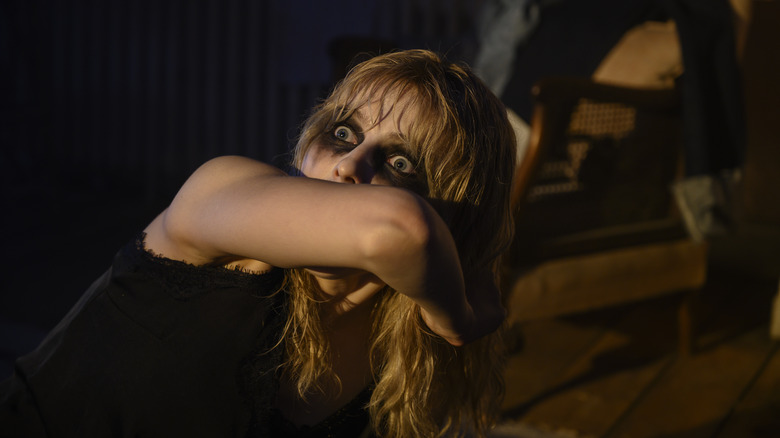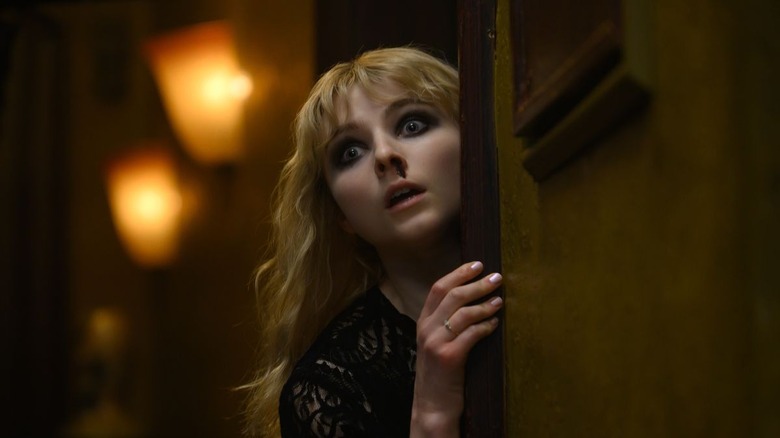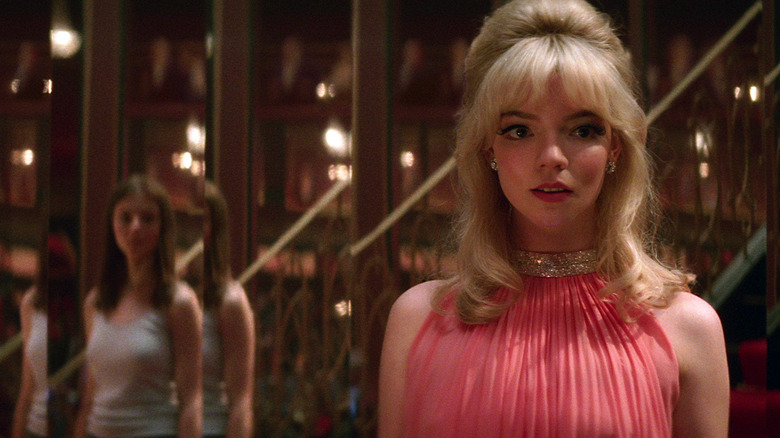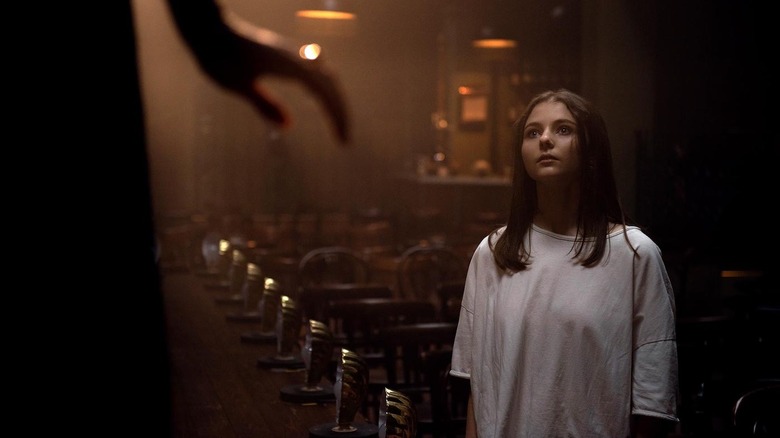
Krysty Wilson-Cairns is a writer on the rise, and her credits back up the hype. She co-write the terrific new horror movie "Last Night on Soho" with director Edgar Wright. She's fresh off an Oscar nomination for "1917." She cut her teeth on the late, great Showtime series "Penny Dreadful." And, of course, she's writing a new "Star Wars" movie for director Taika Waititi. And in conversation, the Scottish screenwriter is as smart and funny and thoughtful as her work.
I spoke with Wilson-Cairns about her work on "Last Night in Soho," with a few necessary tangents into the worlds of "Penny Dreadful" and "Star Wars." In conversation, you immediately understand why so many filmmakers want to work with her. "I made them think it was all their idea," she jokes of the stylish projects she has written and co-written. Here's our full conversation, which has been lightly edited for clarity.
"Can You Take Me On A Tour Of The Seedier Side Of Soho?"

I love the movie.
Oh, good. I'm very glad. I love it, too, but I'm slightly biased.
I know this is the question you get asked at the beginning of every interview, but how did Edgar Wright approach you for this?
Well, so cast your mind's eye back to 2016, and ["1917" director] Sam Mendes actually introduced Edgar and I just as friends. He was like, "You guys would really get on. You'd get on like a house on fire." And Sam Mendes is always right. We met up, we ended up going for drinks in Soho of all places, and we were actually drinking opposite the strip club I used to... I say opposite. We weren't in the strip club. I happened to mention to Edgar, I was like, "Well, that's my old apartment." It was really loud. And he was like, "Oh, you used to live in Soho?" I was like, "Yeah, I worked in a bar around the corner." I was like, "Yeah, I spent a lot of my time here and I still do. My office is still here, in fact." And he said, "Well, I have this idea. It's about this young girl, and it's a story set in Soho. Can I tell you about it?" And I went, "Yeah." And he went, "Can you take me on a tour of the seedier side of Soho?" and I was like, "Of course I can."
So we went on a sort of pub crawl and we ended up in a basement bar called Trisha's. And in the corner of this basement bar, a few gins in, Edgar told me the story of "Last Night in Soho." I remember sitting there, and I feel entranced. I loved it. And he was just telling me as a friend and just for sort of general thoughts. Then about nine months later, I got a phone call, a phone call I always love. It was Edgar, and he said, "Do you remember that story?" I was like, "Yes, I do. I think about it literally every day as I move through Soho," and he was like, "Do you want to co-write it with me?" And that was a very quick yes. I don't even think he'd finished his sentence when I was like, "Yes." And he went, "Okay, great. I'll see you in three weeks."
Then he sent over a bunch of research, he sent over a playlist, he started sending me DVDs, and they ended up being as tall as I am, a stack of DVDs. And then we met in Soho at his offices. It looked a bit like John Doe from "Seven," like real serial killer style, lots of notes up in the wall, lots of images. He thought that would scare me off, but actually that's my aesthetic so it was great. And we started writing it. We just had really good fun starting to break down the story, talk about the characters, develop it. We started to pull more out of the '60s, and eat a lot of Maltesers.
I've interviewed Edgar a few times, and I feel like you can't go two minutes without him mentioning a movie. So what was in that DVD stack he gave you?
My God. Do you know what? I couldn't even begin. Some of it was like "Taste of Honey," a lot of the giallo genre, a lot of those kinds of psychological thrillers, and then some obscure, BFI, archival stuff, things you've never heard of. And it wasn't so much like, "This is what I want to make." It was more like, "These are films that are set in Soho. These are films that were made here. This is a film that inspired me, but I don't know why," and all this sort of stuff. I know few people that know more about film than Edgar, film and music, because I don't have very good taste in music, right? At the party, no one never wants to give me the iPad. No one ever wants to let my Spotify go on. But briefly when I was working with him... First of all, he introduced me to the Sparks brothers, who are great. And I had this playlist, Five Star Soho, and I used to go to parties and dinner parties, and I'd be like, "Oh, I'll put some music on." And for like a year, all my friends were like, "How's your taste in music gotten so good?" And now the movie's come out, they realize I just stole it.
"I Made Them Think It Was All Their Idea."

"Last Night in Soho" and "1917" couldn't seem more different on the outset, but they're both so heavily stylized, where the style is part of the story. How much of that is visualized on the page?
Both of them are, I suppose, different and very similar. And ultimately, the style of both of them is to let you into the characters' inner worlds. With "1917," you walk every step with George MacKay and you understand everything that he's going through and you're taking in the moment. And with "Last Night in Soho," the use of the mirrors is the idea of Ellie's fracturing idea of reality. Who is she and who does she want to be? What is she trying to become? So I suppose both of those stylistic choices are actually all about character, and I think that's all really matters when you're writing. Personally, I believe every script should be visual because film is a visual medium. If you're not writing visually, I don't think you're doing it right. And I had the delightful pleasure of co-writing with the director, so they were never worried that I was telling them what to do. I made them think it was all their idea. [laughs]
What's your relationship with nostalgia? "Last Night in Soho" is about the danger of blindly loving something, so I'm curious about how you feel about nostalgia in general.
I love nostalgia in the sense that I find it incredibly fascinating. And I'm also quite a nostalgic person. I always think, "Oh, it'd be lovely to go back then, or I'd love to revisit that time. I'd love to travel through time and see what this was like and be there and be there." And I think that's nice to an extent, but you have to be careful that you don't be so consumed by the past that you forget about the present or the future. I think in recent years, nostalgia's being weaponized. People talk about the good old days, "Oh, why don't we go back to the good old days? Vote for me. I'll take you back to the good old days," and I think that is where it crosses the tipping point from a hobby, to something nice, to something that's actively dangerous in our world.
I could get really nerdy about nostalgia, but originally nostalgia was a classified illness that happened to Swiss mercenaries when they were fighting for the Pope. They were so homesick they couldn't function and it was called an illness. And then through the centuries it kind of gets twisted all the way down to something that's now kind of quaint and kitsch. But yeah, I think just the right amount of nostalgia is nice and to respect the past and to want to know more about it, but too much is dangerous. And this film is very much about how the past is not what you think it is.
When I started this film, the most I knew about the '60s... Swinging Sixties, Carnaby Street, amazing music, really great mini skirts, fantastic clothes, birth control, all things you're like, "Great, thank you. Really pleased with that decade." But as we got into the research and things to dig into, you're like, "Wow, this had so many problems, so many issues." The way women were treated, for me, was one of the first and foremost issues. It was crazy. You couldn't even have a credit card if you were a woman back then. There was no sense of equality whatsoever. So I think scratching the surface of that and understanding it, you begin to think, "Oh, wow, all these problems were being glossed over." And there's still a lot of problems that we have today, a lot of the way women are treated, the toxic masculinity, the sort of exploitation of women. You only have to look at the news to know that's still a huge issue in our world, and I think drawing attention to that is very important.
In the movie itself, nostalgia becomes a literal sickness. The lead character goes through a physical transformation. I did not know that about the origin of the word.
I'm a big nerd. I know of these things. I learned these things because I'm a big old nerd.
One of my favorite things in horror movies, and I mean this literally, because my wife and I get pumped when we see it, is when people go to a library or they pull up the internet and they research. My wife even has as a song she invented. She sings, [badly sings] "internet research part of the movie." Even when it's not internet, she sings it.
Did she have to sing, "microfiche part of the movie"?
Yes, let's talk about microfilm. I think microfilm is the most cinematic research for horror movies.
It is, isn't it? It's really glorious.
Can you talk about writing a good microfilm research scene? Because I need to know.
Well, a lot goes into it, as you know. You have to spend a lot of time composing that research. Well, I always think characters should do what you would do. Ellie is trying to solve the problem the way Edgar and I would try and solve the problem, which is like, "Well, okay, I need to..." She goes to the police; they won't listen to her. The police officer says, "If we had a full name, maybe that's where we can go. That's something we could start from," and she's like, "Well, right. Where would I get a full name?" I guess newspapers from the day, not digitized, so head to that gorgeous library. What location that library is, and I get the microfiche out.
"Mickey Mouse Will Burst Into This Room And Beat Me Up."

So I know you can't talk about this, but I'm going to ask anyway because it's my job. I know you're working on a "Star Wars" movie. I know you can't say anything about it, so I'll ask a related question. What is it that you personally get out of "Star Wars" that you enjoy and hope to see in a "Star Wars" movie?
It's dangerous you're asking these questions. You know if I answer incorrectly, Mickey Mouse will burst into this room and beat me up? And I was in therapy for years about that fear, so it's clear and present. What I love about "Star Wars" is that they're incredibly transformative. There's a little bit nostalgia in them, but they can change and adapt with the times. So I think, yeah, I'll watch "Star Wars" all day is what I love about them.
I think "Penny Dreadful" is one of the best TV shows I've ever seen.
Thank you.
I feel like, in a different year, it would've had like a "Game of Thrones"-sized audience.
We're just too soon, weren't we? We're just too soon. John Logan, you were too ahead of the times.
I'm curious if you have any thoughts on that.
Because I was part of it, it's so hard to then see the outside in. I loved "Penny Dreadful." I thought it was a really original idea to take a lot of the stories of monsters and make them human. I think ultimately all of us can sometimes feel completely on the outside and completely adrift and completely lost, and so it's very easy to then understand Frankenstein and Frankenstein's monster or the wolfman or Dracula.
It was my first job in film. I was there every day on the set. John Logan and Andrew Hinderaker and I were the only writers on it, and John Logan took me so under his wing and taught me how to write and taught me how to write action and really spent the time as a mentor. So I have just such lovely, pleasant memories of it. And I got to hang out with Josh Hartnett. When I was at an all girls school in Scotland, we watched a lot of "40 Days and 40 Nights." It was my 10-year school reunion about the time that I was working on that, and I remember thinking, "If I could just take a picture of me and Josh Hartnett bring to this school reunion, I will have won life."
"Last Night in Soho" is in theaters now.
Read this next: The 15 Funniest Movies Of The Decade
The post Last Night in Soho Writer Krysty Wilson-Cairns Wants the Director to Think It's Their Idea [Interview] appeared first on /Film.
0 Commentaires